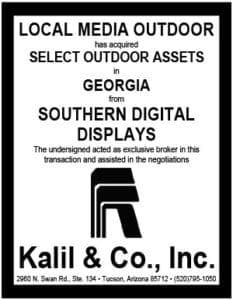 Kerry Yoakum, an attorney, is a vice president of the OAAA
Kerry Yoakum, an attorney, is a vice president of the OAAA
The US Department of Justice (DOJ) is taking sides in a First Amendment lawsuit challenging transit’s ability to restrict religious ads.
In Washington, DC, the Catholic Church has been fighting a losing court battle, which was prompted by the regional transit system’s refusal to run the church’s Christmas ads.
On January 16, the Justice Department filed a clearly worded brief in federal appeals court supporting the church’s claim:
“WMATA’s (metro transit authority) policy constitutes unconstitutional viewpoint discrimination. The policy directly contravenes Supreme Court precedents that
preclude the government from disfavoring speech from a religious perspective.
The result is that messages encouraging religious exercise — a right also protected
by the First Amendment — are singled out as unacceptable.”
Background
The Archdiocese of Washington, DC, wanted to place transit ads showing a Biblical Christmas scene along with a hashtag and website encouraging church attendance and donations.

The transit system (“Metro”) refused, citing its 2015 policy against ads “that promote or oppose any religion, religious practice or belief.” The Archdiocese sued in November; a federal judge declined to grant an injunction that would force Metro to accept the ad.
A federal appeals court agreed that an injunction was not warranted and set oral arguments on the merits next month.
This case is interesting because:
- Transit advertising contracts often include restrictions on various categories of advertising such as vice, political, religious, or controversial content
- DOJ, led by Attorney General Jeff Sessions, supports religious freedoms
- The Reed case has entered the mix. Associate Attorney General Rachel Brand: “As the Supreme Court, in Reed v. Town of Gilbert has made it clear, the First Amendment prohibits the government from discriminating against religious viewpoints.”
In 2015, the US Supreme Court struck down the sign code in Gilbert, AZ, because it treated temporary church signs differently than other temporary signs.
[wpforms id=”9787″]
Paid Advertisement

















